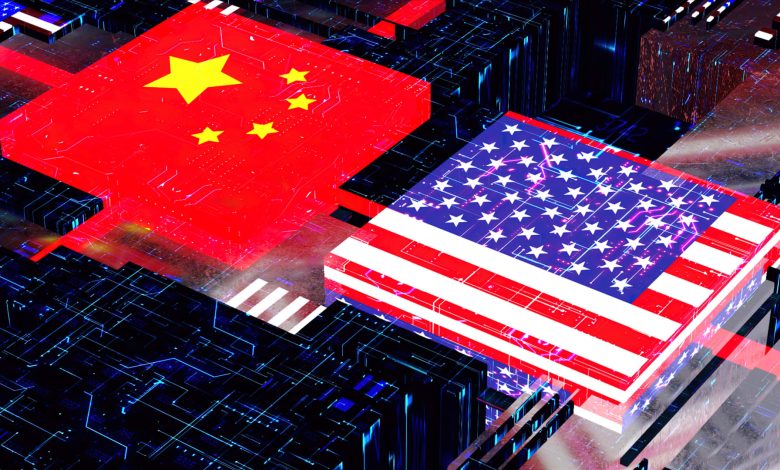Trump tariffs and China export curbs cast cloud over major chip stocks

Illustration of the China and U.S. flag on a central processing unit.
Blackdovfx | Istock | Getty Images
Uncertainty — that was the theme during earnings season for the world’s biggest semiconductor firms which are unclear on demand for their products as a result of changing U.S. tariff policy and export restrictions that have been place on China.
U.S. President Donald Trump’s “reciprocal” tariffs took effect in April though they were paused shortly after. The White House also exempted certain tech products such as smartphones and chips. However, the U.S. is investigating imports of semiconductor technology which could come under new duties.
Meanwhile, Washington last month added more semiconductor products from Nvidia and AMD to a list of items that are restricted for export to China, building on Biden-era curbs.
The changing tariff and China policy has caused consternation among executives at the world’s largest chip companies with visible impacts on their busiensses already.
AMD on Tuesday said that it expects $1.5 billion in lost revenue thorugh the end of its fiscal year as a result of AI chip export curbs to China, despite topping earnings estimates for the first quarter.
Super Micro issued disappointing guidance on Tuesday citing tariff and macroeconomic uncertainty. The company said it would not provide guidance for its fiscal year 2026 until “visibility” becomes clearer. The stock fell 4% in premarket trade.
And Marvell said on Tuesday that it is postponing its previously scheduled investor day from June 10 to a “future date in calendar 2026.” Shares of the firm fell 4.4% in premarket trade.
“We have decided to postpone our investor day given the current uncertain macroeconomic environment,” Matt Murphy, CEO of Marvell, said in a statement.
Clarity in ‘short supply’
Semiconductor stocks have been under pressure this year amid the growing macroeconomic uncertainty and trade policies from the U.S. There is also concern about the demand for AI products even as technology giants like Microsoft and Amazon continue to commit billions of dollars to build data centers.
The VanEck Semiconductor ETF, a basket of chip stocks, is down nearly 12% this year.
And it’s not just U.S. companies that are feeling the heat. Samsung said last month that “demand volatiltiy is expected to be quite high” as a result of tariff policy changes and macroeconomic uncertainty.
“Due to the rapid changes in policies and geopolitical tensions among major countries, it’s difficult to accurately predict the business impact of tariffs and countermeasures,” a Samsung executive said on the earnings call.
“There are a lot of uncertainties ahead of us.”
Samsung is one of the world’s largest memory chipmakers.
“The semiconductor sector is grappling with a complex mix of demand signals and geopolitical headwinds,” Ben Barringer, global technology analyst at Quilter Cheviot, told CNBC by email.
Barringer said that Marvell’s decision to postpone its investor day “adds a layer of uncertainty at a time when clarity is in short supply,” while Super Micro’s weak outlook also “raised eyebrows.”
“With macro uncertainty and export restrictions still looming large, the path ahead for chipmakers remains bumpy, even as underlying demand holds up in certain areas,” Barringer added.
Nvidia CEO: ‘Let us go race’
The U.S. chip industry has sought to show that it is leading in technology versus China and that it should be allowed to sell more product there.
Nvidia CEO Jensen Huang told CNBC on Tuesday that China will likely be a $50 billion artificial intelligence market in two-to-three years.
“It would be a tremendous loss not to be able to address it as an American company. It’s going to bring back revenues, it’s going to bring back taxes, it’s going to create lots of jobs here in the United States,” Huang said.

For the last few years, Washington under both Biden and Trump, have looked to use export restrictions to restrict China’s access to American technology in areas such as AI and semiconductors. This has prompted Chinese firms to ramp up focus on homegrown technology with companies like Huawei looking to create viable competing products to the likes of Nvidia.
Chinese companies such as DeepSeek and Alibaba have also been able to launch high-performing AI models.
Nvidia’s Huang said there is competition in AI right now but American firms should be able to compete with China.
“The United States has to recognize that we are not the only country in that race, that we have competitors. We are confident people, we are a confident country we have confident companies, we are not afraid of a race. We look forward to a race. Just let us go race,” Huang told CNBC.
“And so I think that now is the time when the United States needs to realize that we need to put the pedal to the metal … we’ve just got to go for it. Waiting around, talking about it, trying to hold people back is not necessarily the best move. The best move is let American do American, let us go after it and win it.”



